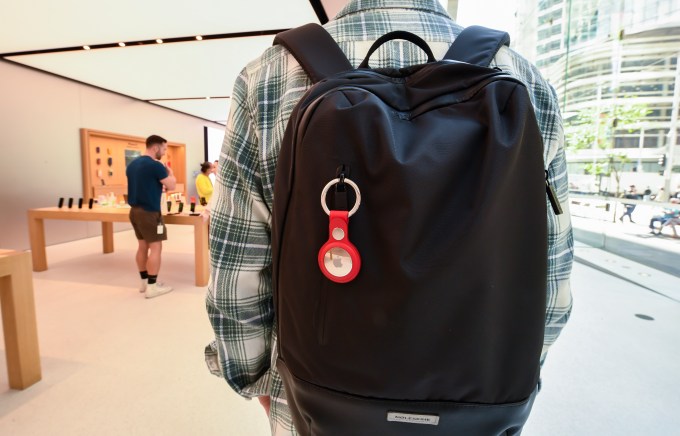Hello friends, and welcome back to Week in Review!
I’ve taken the last few weeks to unwind and ensure that my 2022 hot takes are as scorching as possible, or at least as prescient as possible. This week, we’re talking about what I’m sure could be one of Apple’s biggest scandals of the decade thus far: the itty bitty AirTag.
You can get this in your inbox every Saturday morning from the newsletter page, and follow my tweets @lucasmtny.

(Photo by James D. Morgan/Getty Images)
the big thing
AirTags are a very useful product from Apple that pretty much function exactly as advertised.
Unfortunately, that’s the problem.
There’s been a fair bit of controversy lately around how Apple rolled these out and how even though these are great devices to keep track of your keys, they can also easily be abused to stalk someone. This isn’t a purely theoretical issue either, it’s already happening.
It’s not a particularly unique scenario where technology can be used for good and bad purposes — just think about the decades-long conversation around encryption — that said I have a feeling that this is a scenario where Apple is going to lose and it’s going to be more embarrassing than any misstep in recent memory.
Apple has arranged so much of their wearable product marketing over the last few years on how their devices function in edge use cases. The Apple Watch’s last several generations have focused on health tracking features that could help identify rare conditions or help users in a life-threatening situation. TV commercials have documented the individual stories of users who have found the Apple Watch to be a life-saving tool. With AirTags, there’s potential for some of that same good, but there’s also much more downside. In the next year, we’re undoubtedly going to see examples of AirTags being used in nefarious ways that bundled together serve as the antithesis of one of these Apple Watch commercials. It may end up being a product defined by its gross shortcomings.

Image Credits: Built for Mars screengrab
Apple has made its own post-launch efforts to tighten up how AirTags that don’t belong to a certain user can be detected, but these notifications have proven buggy and have often waited far too long to alert users. Add in the fact that Apple has seemed to treat Android integration as an afterthought, not a necessary partnership in order to ship a device like this, and Apple’s incompetence looks a bit more severe.
I highly doubt that Apple is going to be able to design their way out of this problem. Regardless of what they ship on iOS to backtrack issues, Android’s fractured ecosystem means that safeguards won’t reach an awful lot of people who could be targeted.
For a nascent product category with such PR liability potential, it’s hard to see how Apple justifies continuing to sell AirTags. It’s a unique error from Apple in that the company delivered exactly what they initially promised but failed to consider the full scope of that initial promise’s direct consequences.

(Photo by Justin Sullivan/Getty Images)
other things
Here are a few stories this week I think you should take a closer look at:
Elizabeth Holmes convicted on 4 of 11 counts
At long last, the trial of Theranos founder Elizabeth Holmes reached a resolution. Now, we wait for sentencing as well as further guidance on whether Holmes will be retried for several of the counts that the jury could not reach a verdict on. “Holmes was found guilty of conspiring to defraud investors, as well as defrauding investors from the DeVos family, hedge fund manager Brian Grossman and former estate and trust attorney Dan Mosely. She was not found guilty of charges related to defrauding patients,” my colleague Amanda reported.
Google infringed on Sonos tech, trade court rules
Google’s smart speakers infringed on key patents held by Sonos, a US regulator ruled this week, and the company will no longer be allowed to import the infringing products which are manufactured in China. Google has already begun rolling out design changes which it hopes will interrupt its ability to sell its smart speaker devices. Sonos has seen its early lead in the smart speaker war dissipate as tech giants have thrown their weight around, but the smaller hardware company isn’t shrinking away.
A smaller, quieter CES
The Omicron wave stopped the TechCrunch team from making our way to Las Vegas to check out the latest gadgets at the Consumer Electronics Show, but we were at the show in spirit and watching along with countless livestreams. While it was certainly a more low-key year, there were still plenty of wild gadgets this year. Here are some of the best ones we saw.

Image Credits: Jasmin Merdan (opens in a new window) / Getty Images
added things
Some of my favorite reads from our TechCrunch+ subscription service this week:
How startups can prevent tech debt from piling up
“…Favoring a short-term plan to get a faster go-to-market option is not always bad, provided the business has a backup plan to deliver well-designed code that would simplify future iterations and innovations. But for startups, reworking is difficult as deadlines and resource crunch prevent developers from producing clean and perfect code. Startups prioritize short-term plans and focus more on adding functionalities to achieve milestones, sign up marquee customers or raise funding. This roadmap shuffling and disregard for the long-term view trigger tech debt…”
5 growth marketing predictions for 2022
“…It’s been a crazy year in growth marketing, what with the meteoric rise of TikTok, radical iOS privacy shifts and a staggering $240 billion poured into U.S. startups as of September 30. All of this new money has meant heavier investments in growth marketing throughout 2021. The heavier investments have occurred during uncertain times, with startups scrambling to find ways to measure iOS conversions and unlock TikTok as a new channel…“
3 things founders need to know about M&A
“…M&A is particularly beneficial for startups that struggle to scale operationally because they essentially buy cash flow, revenue and other companies’ traffic, meaning startups grab a bigger share of their markets. They’re also a good way for startups to find, consolidate and experiment with their value proposition. The problem though, is that most founders don’t know how to get started with M&A and resign themselves to the shadows of bigger players. But mergers are accessible and advantageous to businesses of all sizes…”
Thanks for reading, and again, you can get this in your inbox every Saturday morning from the newsletter page, and follow my tweets @lucasmtny.
Have a great week!















 English (US) ·
English (US) ·